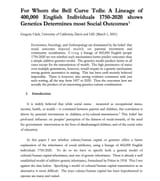Search Results
7/9/2025, 3:01:22 PM
>>212515068
This has been tested and what you're insinuating is false.
in general families only stay rich for multiple generations because they have better genes for being successful and the equivalent goes for people who have been poor for multiple generations.
An economist tracked social status of 400000 people in England for hundreds of years using church records that recorded marriage, ancestry plus occupation and found that an additive genetic model fit the data for how socioeconomic status is passed on far better than an environmental-cultural models.
For example an "wealth gets passed on" environmental model would reason that because wealth during childhood is so important for the adult outcomes of children, then a middle income family that has only 1 or 2 children where the parents can spend a lot of money on each of child should have children that end up much more successful than a middle income family that has only 6 or 10 or 12 children. But in reality, whether you have one kid that you spend tonnes of money on or 12 kids that you spend 12 times less money on , your kids will end up basically the same levels of success as adults. If you have 12 kids your kids would only end up 7% less successful than if you had 1 kid.
This result what would you would expect to observe if success in adulthood is mainly caused by inherited genetic characteristics of mental ability and temperament but is the opposite of what you would expect to observe if success in adulthood is mainly caused by how wealthy your upbringing is and how much money is spent on you.
https://milkyeggs.com/wp-content/uploads/2023/02/ClarkGlasgow2021.pdf
see pages 24 and 25 for the result I talked about.
This has been tested and what you're insinuating is false.
in general families only stay rich for multiple generations because they have better genes for being successful and the equivalent goes for people who have been poor for multiple generations.
An economist tracked social status of 400000 people in England for hundreds of years using church records that recorded marriage, ancestry plus occupation and found that an additive genetic model fit the data for how socioeconomic status is passed on far better than an environmental-cultural models.
For example an "wealth gets passed on" environmental model would reason that because wealth during childhood is so important for the adult outcomes of children, then a middle income family that has only 1 or 2 children where the parents can spend a lot of money on each of child should have children that end up much more successful than a middle income family that has only 6 or 10 or 12 children. But in reality, whether you have one kid that you spend tonnes of money on or 12 kids that you spend 12 times less money on , your kids will end up basically the same levels of success as adults. If you have 12 kids your kids would only end up 7% less successful than if you had 1 kid.
This result what would you would expect to observe if success in adulthood is mainly caused by inherited genetic characteristics of mental ability and temperament but is the opposite of what you would expect to observe if success in adulthood is mainly caused by how wealthy your upbringing is and how much money is spent on you.
https://milkyeggs.com/wp-content/uploads/2023/02/ClarkGlasgow2021.pdf
see pages 24 and 25 for the result I talked about.
Page 1
